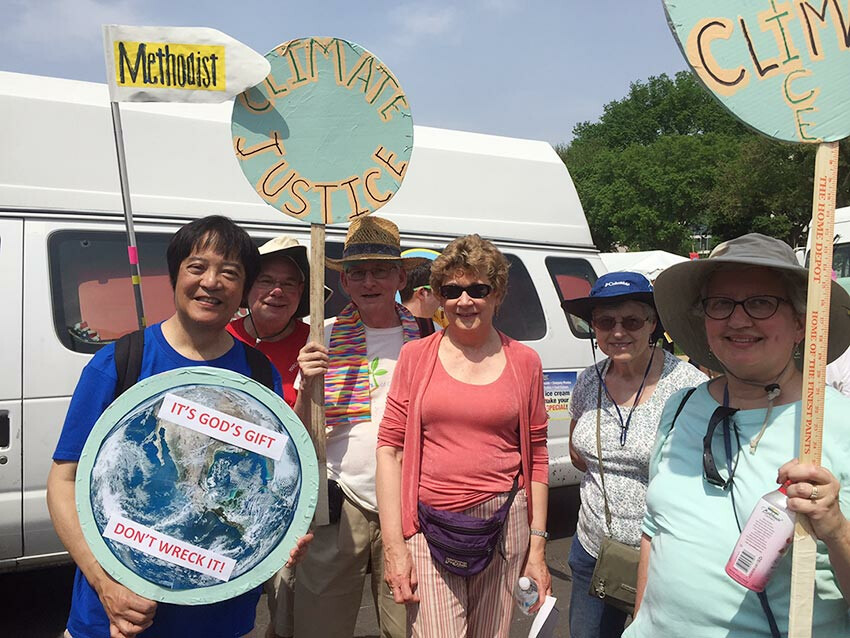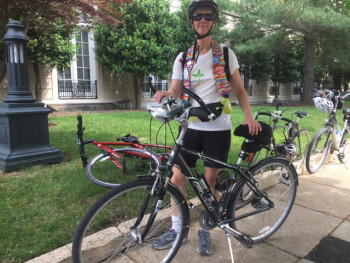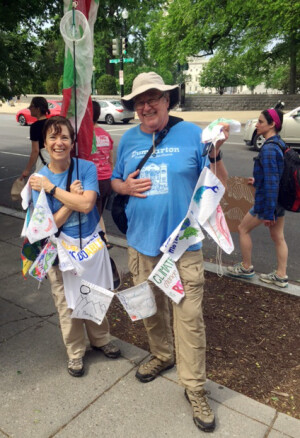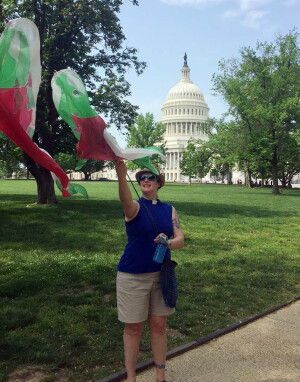UMs add their voices to Peoples Climate March

(L-R) Steven Fong, from Middletown UMC, stands with John Barnes, Glen Mar UMC, Mike Koob, Middletown UMC, the Rev. Kathy Kohl, Colesville UMC, Annie McLane, Colesville UMC, and Sheri Koob, Middletown UMC, at the start of the Peoples Climate March on April 29. Photo by Erik Alsgaard.
By Erik Alsgaard
UMConnection Staff
An estimated 200,000 people converged on Washington, D.C., April 29, for the Peoples Climate March. United Methodists added their voices to the march, which addressed the crisis of global warming, and protested what many see as policy changes by the Trump administration that will harm the environment.
Starting with an interfaith prayer service on the steps of the United Methodist Building on Capitol Hill, hundreds of United Methodist marchers braved the scorching 91-degree heat carrying signs saying “There is No
From there, United Methodists joined the thousands who gathered behind the U.S. Capitol and marched down Pennsylvania Ave., around the White House, and ended at the Washington Monument.
Sung-ok Lee, Assistant General Secretary for Christian Social Action for the United Methodist Women in New York, said she was at the march to call for climate justice.
“We are calling on the current administration to devote and commit to stopping the global warming process that is going on,” Lee said. “We would like to see more done to protect the environment and God’s precious creation.”
Lee, a Deaconess appointed by the New York Conference to the UMW, said that climate justice was one of four key issues they are working on for the next four years.
“We are on track to address the various issues within climate justice, including environmental racism. The most vulnerable communities are paying for the carbon emission that is happening,” she said. Other issue priorities for the UMW include maternal and child health, ending
The march happened just hours after the Environmental Protection Agency (EPA) removed most of its references to climate change on its website. According to CNN, the EPA issued a press release stating that language on the website was being updated to "reflect the approach of new leadership." EPA director Scott Pruitt was quoted in March as saying that he didn’t believe carbon dioxide emissions were a “primary contributor” to global warming.
The Rev. Ben Roberts, Director of Social Justice Ministries at Foundry UMC in Washington, said that his church has, for the last several months, intentionally worked on ways the congregation can engage with current social issues. This ministry is called “Sacred Resistance.” Roberts said the march was just one aspect of what they’re doing on climate justice.
“We’ve had multiple members go through the caretakers training,” Roberts said, “and they are here and marching. What they’re learning they are bringing back.”
For Roberts, the issue is personal. He grew up on an island in North Carolina. “I’m a surfer, and it’s much better when it’s not trashy and your house isn’t

Jill Barker
One of those caretakers is Jill Barker, a member of Foundry who proudly called herself “a newly minted United Methodist Earthkeeper.” To be an Earthkeeper, she said, involved several days of Bible-based study on
“Earthkeepers are United Methodists who are keenly aware of the ecological challenges in our world today and feel called to be part of a movement to transform the world,” according to the grassroots organization, Caretakers of God’s Creation. The Earthkeepers program is offered by Global
Earthkeepers are lay and clergy, Barker said. Each Earthkeeper, to be certified, must develop a project in their local community. Barker’s project where she lives in Arlington, Va., deals with energy efficiency and the need for the church to step in and provide this for the poor.
Jim Quinn, a member of Dumbarton UMC in Washington, worked for the Department of Energy for 35 years with a focus on renewable energy. His work took him to Europe, India, China, and several other countries.

Jim Quinn, right, stands with Mittie Quinn, his wife, at the Peoples Climate March April 29 in Washington, D.C.
“Climate change is happening,” he said. “Over the past 20 years, we have had several of the hottest days recorded since the 1800s.”
Quinn said that he was at the march to add his voice to the message that changes need to be made.
“We think that the only way that we’re really going to do something about this is to all
Quinn said the United States needs to start by looking at its economy and how it is based on fossil fuels that emit greenhouse gases. Instead of using coal or petroleum-based products for energy, he would like to see the country move to more energy efficient sources, such as solar and wind.
“We’re not on a good trajectory in the U.S.,” he said. “We should be weaning ourselves away from coal, away from fossil fuels. Even when we do (use them), they should be extremely efficient.” Quinn said that fossil-based fuels have an efficiency of about 33 percent – meaning that only about a third of the possible energy in a unit of coal is extracted. Increased efficiency would lower carbon dioxide emissions.

The Rev. Dottie Yunger
The Rev. Dottie Yunger,
“By that, I mean all of God’s people and all of the critters, the systems, the watersheds,” she said. “I’m here today to show my support for all of God’s creation.”
“They don’t have the luxury of thinking about climate change as something abstract,” she said. “It is real; it is present. Not everyone might call it climate change. Not everyone might call it global warming, but they’re seeing the effects.”
“But I was also a United Methodist,” she said, “and those two worlds would never intersect. I never heard anything on Sunday about caring for creation, and at work, it was not cool to be a scientist and a person of faith.”
But then God had other plans.
“Being a minister is the way for me to embrace both of those calls in my life,” Yunger said. “Today’s march is a beautiful expression of all of those worlds coming together.”
